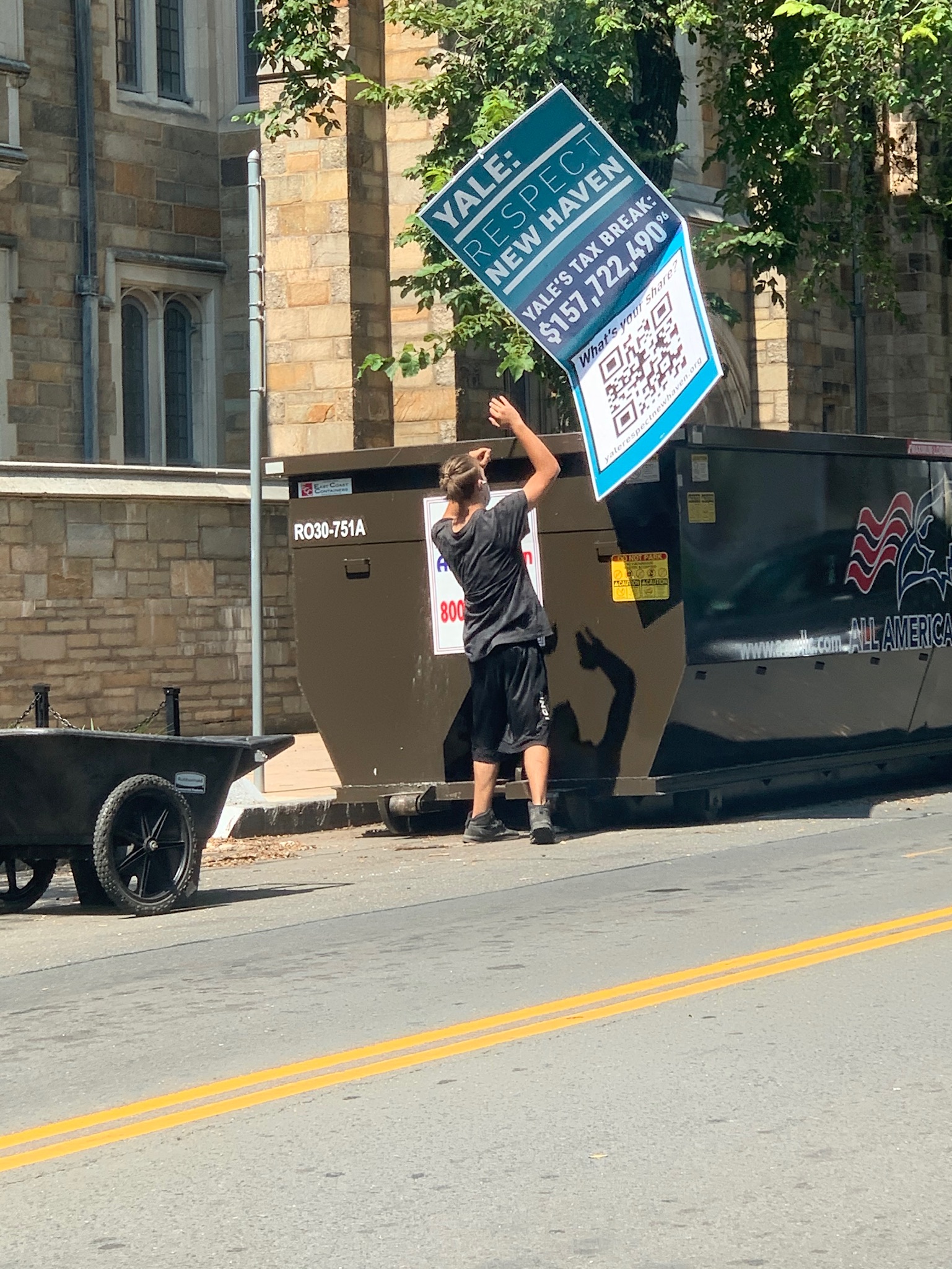
Courtesy of Ian Dunn
As students moved into campus in the past week, University employees took down signs around campus calling on Yale to pay higher taxes to the city of New Haven.
New Haven Rising, an organization advocating for economic and racial justice in the city, posted the signs as part of its Yale: Respect New Haven initiative. The initiative argues that Yale, which does not pay taxes on designated property for educational use, should voluntarily contribute approximately $150 million more annually to the city — the amount it would owe if all of its property were taxed. Activists put up towering signs, each more than six feet tall, on public property near campus and posted smaller posters on Yale bulletin boards, but University staff removed them and threw them away in dumpsters.
Director of University Media Relations Karen Peart said staff members, including some that were helping students to move in, removed the signs, because some of the posters were blocking areas designated for students to drop off their belongings.
“The university regrets the actions of our staff,” Peart wrote in an email to the News. “We will immediately return the signs and compensate the union for the cost of replacing those which cannot be located.”
In an interview with the News, director of New Haven Rising Rev. Scott Marks said his group has been working with the University in the past five years to push Yale to hire more city residents. He also called on the University — including the Yale New Haven Health System — to contribute more to its home city by making fair deals with union leaders and paying more to New Haven in taxes.
Ian Dunn, spokesman for Yale unions Local 34 and 35, said that he had asked the people removing the signs about their reasoning but was told only that they were carrying out their boss’s request. Peart did not directly respond to questions on whether Yale staff members were instructed to remove the signs.
The University has reached out to New Haven Rising leadership about reimbursing the signs.
“We do appreciate them reaching out about that, but it was only after [news of staff removing the signs] came out and the press started asking about it that we got that email,” Dunn said.
In an email to the News, Peart sent photos of Respect New Haven stickers covering Yale posters with QR codes that directed people to the University’s COVID-19 resources. Respect New Haven stickers included QR codes of their own, which took scanners to their campaign website instead.

In a statement provided to the New Haven Register, Dunn said that the covering of Yale’s COVID-19 QR codes was an “aberration, not the plan,” and pledged to make sure it stopped.
Peart said that “close to 100” smaller New Haven Rising and Locals 34 and 35 UNITE HERE posters were placed on campus bulletin boards and obscured the University’s “Healthy Yale” posters. Due to University policy that prohibits more than one poster advertising the same event on each bulletin board, those posters were also removed, Peart explained. Yale also left at least one poster on each bulletin board as a courtesy, she added.
Dunn could not confirm the number of small posters placed on campus because volunteers were told to post as many as possible.
As for the big posters, New Haven Rising put up six per day from Monday through Thursday. Yale staff took them down each day except for Thursday, with six remaining on campus, Dunn said.
Marks explained that the COVID-19 pandemic, which he refers to as “The Great Reveal,” has exacerbated the existing inequality within the city, particularly highlighting the difference between Yale’s wealth and the conditions in which many New Haven residents live. New Haven Rising has called for more financial support from the University given challenges the community faces.
Carlos Brown Jr. ’23 echoed Marks’s sentiment and argued that there is “no reason [to] see this level of inequality in a city that hosts one of the wealthiest universities in the world.”
“Yale depends on New Haven and the thousands of employees that make its day-to-day functions possible,” Brown said. “That alone is more than enough to justify Yale paying up.”
In a March opinion piece published in the Register, University President Peter Salovey wrote about Yale’s close relationship to its home city and cited the University’s direct and indirect contributions to New Haven.
Salovey wrote that he does not believe that “New Haven’s books should be balanced by Yale” penning “bigger checks.”
Currently, the University and Locals 34 and 35 are engaged in a collective bargaining process.







